Hylian becomes more real! After an extensive re-harmonisation of the script and a full development of the prefixes, I have finally translated all the legend of Zelda 5, Ocarina of Time.
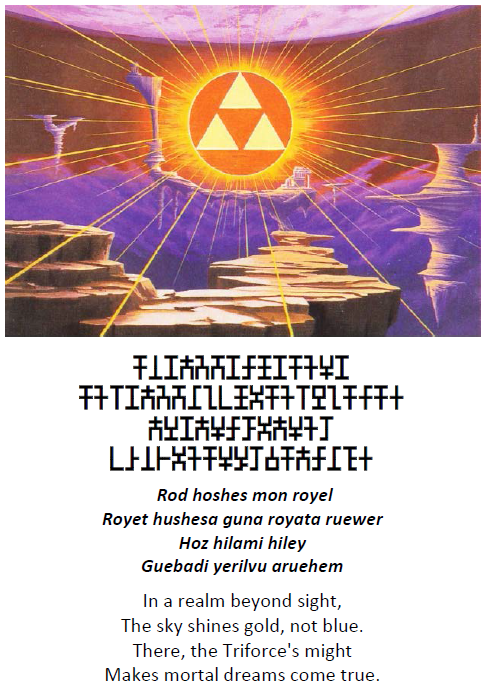
Open the article to see the 7 pages!
Tuesday, May 17 2022
By Matthieu on Tuesday, May 17 2022, 20:44
Hylian becomes more real! After an extensive re-harmonisation of the script and a full development of the prefixes, I have finally translated all the legend of Zelda 5, Ocarina of Time.

Open the article to see the 7 pages!
Monday, February 3 2020
By Matthieu on Monday, February 3 2020, 19:51
Here is my worksheet about biblical lexicon, a clean compilation of various treasures i've found: Strong concordance lists for Hebrew and Greek with translation counts for KJV and NASV, along with the complete KJV with Strong numbers. All in all, this allows word counts through the use of excel functions. Enjoy!
Tuesday, September 10 2019
By Matthieu on Tuesday, September 10 2019, 11:21
Here is a new translation, taking piecemeal the famous legend from Zelda 5 "Ocarina of Time".
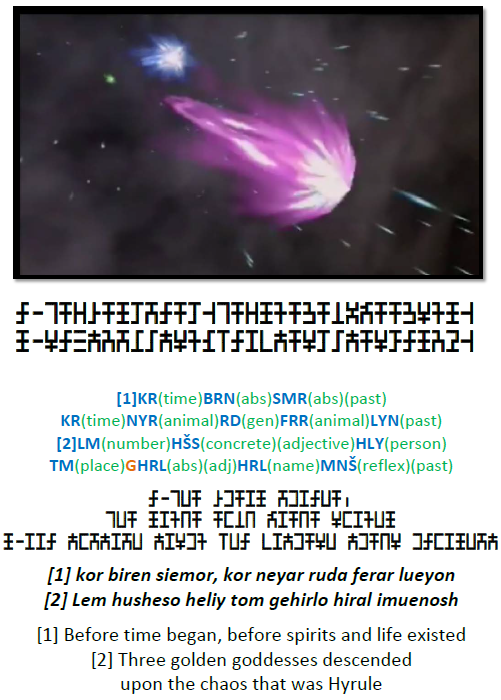
This short text is full of interesting paradoxes. It puts together the ideas of beginning and what was before. The concept of origin is rendered by SMR (from Somaria, creation or start), and that of antecedence by the preposition KR, derived from KKR (from Kokiri, youth or morning roost). That antecedence is part of a cycle imitating the sun and four cardinal points: Est-South-West-North, NotYet-Already-Still-NoMore, Before-Inside-After-Outside. These two contradicting time models, the linear and the cyclical, are closely knit together like a primal bomb ready to expand.
Time is rendered by BRN (from Labrynna, the oracle of Time), with its abstract sense. The concrete one would be "moment".
Finally, "the chaos that was Hyrule" is paradoxical since Hyrule, the cosmos, basically means harmony. Hence "chaos" is constructed as "un-hyrulish". A cosmos yet very un-cosmic, a formless nothing yet to become something.
(Also posted on the ZeldaUniverse forum)
Monday, September 25 2017
By Matthieu on Monday, September 25 2017, 16:14
Cet été un de ces matins vietnamiens, les chats ont déposé au pied de la table deux oisillons agonisant. Les matous n'avaient pas l'air bien émus, peut être simplement ignorant bien et mal.
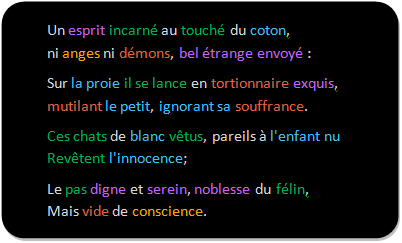
Sunday, February 12 2017
By Matthieu on Sunday, February 12 2017, 17:06
A participation to the Nocta contest, taking you a journey through the gate of Hell, the mist of Purgatory, and the garden of Eden (kind of) :
Click on the picture to listen
Thursday, December 1 2016
By Matthieu on Thursday, December 1 2016, 08:10
A Bible reading session last month posed the question of the afterlife (Mt 22). After a long exploration of the topic, I came to think that it involves questioning the very definition of life and death themselves! Using my habit of emergent layers, applied to an individual person (cf. numeral symbol by Bernard Werber), I came out with this table to describe what it means to be alive or dead:
|
Evolution levels |
State of Life |
State of Death |
|
5. Saint (spiritual) |
Hope, Faith, Love |
Despair, denial/betrayal, hate |
|
4. Human (mental) |
Personality, intelligence, humour |
Madness, mental handicap |
|
3. Animal (emotional) |
Sensory and emotional reaction, desires |
Lethargic, vegetative state |
|
2. Plant (biological) |
Biological life, health |
Handicap, decease |
|
1. Mineral (physical) |
Body, physical presence |
Disaggregation |
|
0. Through others (vicarious) |
Name, stories, worship, statue |
Oblivion |
This table matches the cardinal cycle and the 4 fields of education, with 2: sport for the body, 3: art for the heart, 4: science for the mind, and 5: wisdom for the soul. I also add a “zero” level which corresponds to our life (and survival!) through others: how we are known and remembered. With this table, it appears that death is often gradual: being handicapped, desperate, and ignored, already cripples the wholeness of our life. Often the death of the higher levels would cause the lower ones in turn to crumble. However we can also imagine the death of an unknown person, keeping quietly his wisdom and conscience till the end.
The above table may seem to over-analyse life and death, cutting it into thin nuances, but actually the Greek vocabulary of the New Testament also does so! One of my cousin underlined that in the Gospels there is a distinction between 3 forms of life: Bios: life of the body (2) and (3), Psyche: life of the mind (4), and Zoe: eternal life of the soul (5). We can also match these with the 3 loves: Eros of the body, Philia of the mind, and Agape of the soul. As I like to believe, vocabulary and grammar help with philosophy.
From the etymological angle, resurrection comes from the Latin "resurgere", "to spring up again", akin to "source" but without the idea of "origin". In Chinese 復活 is "return to life", in Vietnamese Phục sinh 復生 is "rebirth". In Greek Ανάσταση: "stand up". It sounds sometimes like a return to our previous life, or the start of a new one.
If we consider that, in the face of his death, a man’s salvation consist in keeping his life, it seems that most cultures tend to focus on the lower levels: a grave, a legend, a statue to remain in people’s head (0), and sometimes a mummy to keep the body. Then many religions and beliefs promise to restore the body (1), bring it back to physical life and health (2), enjoy a paradisaical existence of pleasures (3), and optionally some grand revelations (4).

What if it were the other way around, eternal life through the higher levels? Simply survive as spirits (4), free from bodily life and heaviness, taking with us the most precious fruits of our soul (5). Like the butterfly leaving the caterpillar cocoon. In Christian context, the realization of divine salvation implies the irrelevance of hope and faith: only love is to remain. Christian theology tells however that the body will be restored, in an uncorruptible form, because God created matter as part of a good creation, as opposed to gnostics who believe that matter is an evil prison for the soul.
Could this utlimate bliss scene also mean to abandon our individuality? Meeting face to face with God should be a fantastic love burst, surely calling for a fusion, following the example of the Trinity. That would mean that even our own self (4) fades out as we merge back into the source of light.
Even further, if this salvation leads to an eternal state of perfection, could time disappear? Time would mean motion and evolution, but hard to imagine a dynamic perfection lasting forever! It would necessary imply fluctuations around the optimum, and the absence of overall increase of excellence would mean terrible boredom for the spirits endowed with memory. Even if their memory were wiped regularly so that they may enjoy the same perfect (groundhog) day forever, that would be a kind of time-loop, not so different from a mere interruption of time. Hard to imagine what could be existence without time, our intimate and yet mysterious life drug! We could be either without time (hit into a bliss wall the end of the road, just like the Big Bang sprung from nowhere), or beyond time, seeing it from above like a spiralling track from its beginning till its end.
Tuesday, November 29 2016
By Matthieu on Tuesday, November 29 2016, 09:59
Le psaume 2 est particulier par son intensité et sa concision en 12 versets. Plusieurs mises en musiques ont été réalisées, et c'est la mélodie de Thomas Tallis qui m'a inspiré cette traduction versifiée :
Voici le chant original, en anglais :
Another choir video , and here a cello version.
(1) Why fum'th in fight the Gentiles spite, in fury raging stout?
Why tak'th in hand the people fond, vain things to bring about?
(2) The Kings arise, the Lords devise, in counsels met thereto,
against the Lord with false accord, against His Christ they go.
(3) Let us they say break down their ray of all their bonds and cords
We will renounce that they pronounce their laws as stately lords
(4) But God of might in heaven so bright Shall laugh them all to scorn
The Lord on hie shall them defy they shall be once forlorn?
(9) With iron rod as mighty God, all rebels shalt thou bruse:
And breake them all in pieces small, as sherdes the potters use
(10) Be wise therfore ye kinges the more, Receive ye wisdomes lore:
Ye judges strong of right and wrong, advise you now before
(11) The Lorde in feare your service beare, with dread to him rejoyce:
Let rages be resist not ye, him serve with joyfull voyce
(12) The sonne kisse ye lest wroth he be, lose not the way of rest:
For when his ire is set on fire, who trust in hym be blest!
Voici enfin la flamboyante version de Heinrich Schutz , baroque, sur les paroles de la bible Luther :
(1) Warum toben die Heiden und die Leute reden so vergeblich?
(2) Die König im Lande lehnen sich auf und die Herren ratschlagen miteinander wider den Herren und seinen Gesalbten.
(3) Lasset uns zerreißen ihre Bande und von uns werfen ihre Seile.
(4) Aber der im Himmel wohnet lachet ihr. Und der Herr spottet ihr.
(5) Er wird einest mit ihnen reden in seinem Zorn und mit seinem Grimm wird er sie erschrecken.
(6) Aber ich habe meinen König eingesetzt auf meinem heilgen Berge Zion.
(7) Ich will von einer solchen Weise predigen, dass der Herr zu mir gesagt hat: Du bist mein Sohn, heut hab ich dich gezeuget.
(8) Heische von mir, so will ich dir die Heiden zum Erbe geben und der Welt Ende zum Eigentum.
(9) Du sollst sie mit einem eisern Zepter zerschlagen, wie Töpfe sollst du sie zerschmeißen.
(10) So lasst euch nun weisen, ihr Könige und lasst euch züchtigen, ihr Richter auf Erden.
(11) Dienet dem Herren mit Furcht und freuet euch mit Zittern.
(12) Küsset den Sohn, dass er nicht zürne und ihr umkommet auf dem Wege. Denn sein Zorn wird bald anbrennen. Aber wohl allen, die auf ihn trauen.
By Matthieu on Tuesday, November 29 2016, 08:26
If you're preparing your Christmas choir, here is a colourful arrangement of the famous "Silent night" (Douce nuit):
Click on the picture to listen to a weird vocal recording with 4 Matthieus!
The pdf score is here!
Piano version
Monday, May 16 2016
By Matthieu on Monday, May 16 2016, 10:40
A picture can translate a music, a poem... and why not a creed?
Here is what the Christian credo could look like:
Tuesday, April 5 2016
By Matthieu on Tuesday, April 5 2016, 07:52
 (Abi'ad, "Everlasting Father", as found in Isaiah 9:5)
(Abi'ad, "Everlasting Father", as found in Isaiah 9:5)
A year ago I had this thought: the core conflict between humans and god(s) in ancient mythologies and later in Christianity: autonomy. Humans would always meet punishment after turning away from god(s), declaring themselves free and big enough to be their own masters. Prodigal sons leaving their father...
However, that's what nature teaches us! Fathers care for us and educate us, until we get independent and they grow old, in turn needing our care, and ultimately die. Nature served as model for wisdom and cultures, which teach us to respect fathers, but also to take over from them as we become fathers ourselves, and then do without them as they slowly leave the stage.
If this is the natural model, why isn't God like this? Why are we supposed to behave like dependent children forever?
Maybe the natural model was not meant to be so. In the myth of genesis, humans were first immortal until the first sin. Maybe fathers were supposed to live forever, growing wiser and wiser, always being a reliable source of authority for their descendants. Hmmm... so the whole culture about growing independent would be wrong?
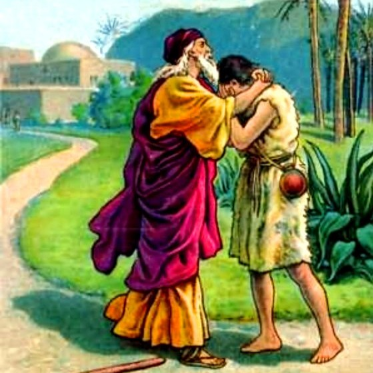
Sunday, March 27 2016
By Matthieu on Sunday, March 27 2016, 17:12
Here is another working document, compiling Bible quotes by topics. The document also contains a Bible summary chapter by chapter. (so far 886 out of 1239 chapters) I don't guaranty the summary's fidelity, but it can come in handy to give a first overview!
Monday, March 14 2016
By Matthieu on Monday, March 14 2016, 04:57
Exergy
19th century's physics explained that all closed systems must evolve into states of higher disorder. This disorder can also be also seen as a dilution of matter and energy: electric charges migrate toward lower potential, radioactive atoms disintegrate into more stable isotopes, high pressure expand into broader space, motion causes friction and converts kinetic energy into thermal energy, heat dilutes into matter of lower temperature... Physics quantifies this amount of disorder-dilution by entropy (from Greek τροπή, change) In any closed system, entropy has to increase. This 2nd law of thermodynamics dictates the time direction in which systems will evolve. This arrow of time cannot be reversed, unless no dilution occurred, or if more entropy is produced elsewhere.
Another way to look at entropy is to measure exergy. It is the opposite idea of entropy, short from of "extractable energy". When entropy is created, exergy is destroyed. Energy cannot be destroyed, it is conserved and converted into diverse forms. (In the case of nuclear reactions, following e=mc2, one considers energy and matter altogether as conserved.) Exergy is the extractable, or "useful", fraction of energy in a system, which can be extracted to produce work and drive motion. Electrical and mechanical energies are virtually 100% exergy, but heat, pressure, and chemical potential depend on how they differ from the surrounding. 1m3 of air at 1bar is useless on the Earth, because it is surrounded by the same pressure, but in outer-space is could produce work by dissipating into vacuum. After all exergy is taken from a system (battery, air tank, fuel, etc.), this system is at equilibrium with the environment and cannot dilute further. This can be compared to a spring of energy and matter which expands and dilutes.
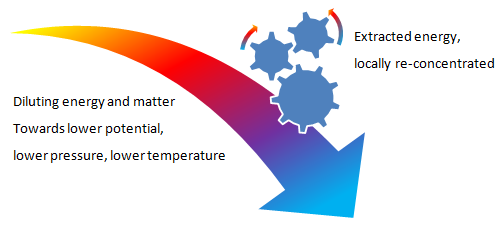
It is to be noted that exergy can be destroyed without any "practical" use (e.g. an electric heater in the ocean..). The definition of exergy pertains to physics and is not anthropocentric, but rather independent from human cultural judgement. (I've discussed it in this 2008 article (in French) )
First conclusion: mass and energy dilution, causing exergy consumption, drives the motion of the universe. It fuels all physical reactions which build this movement into... more complex structures.
Emergence
Emergence is the name given to the phenomenon whereby the complex interactions of many simple elements generate new overall behaviours and entities. For example: life emerges from chemical systems. Life involves behaviours such as metabolism, reproduction, adaptation, which are all new compared to the underlying chemical systems, and could not have been predicted by the study of the chemical level. I've discussed this in a 2012 note, linking scientific fields in Russian doll emergence. I proposed the historical generation: Physical => Chemical => Biological => Psychological => Social. We see a rise of abstraction, and gradual irrelevance of "hard sciences" to study higher levels, replaced by humanities.
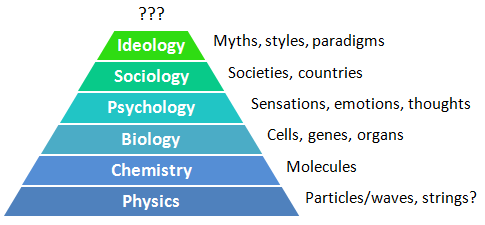
We can distinguish that the 2 necessary ingredients of emergence are the multiplicity of the entities (quantitative), and their specialization (qualitative). Hence emergence moves on through Zig-zag evolution, gaining complexity through both moves.
Emergence produces entities which survive when the underlying components disappear. For example, in a population of bacteria, if one individual mutates with a new better suited DNA trait, it will be inherited by its offspring and gradually become a trait of the whole population. It will survive in the population even after the death of the first new DNA bearer. An invention or an artistic style can still exists after the death of the civilization that made it.
A time goes by, more complex systems arise, which unify smaller components into a whole. Across history, civilizations consist of several societies, made of individuals. A person unifies organs, which unify countless cells, in turn unifying countless molecules, made of atoms.
Second conclusion: emergence federates the motion of small items into larger, fewer, harmonious, and novel entities. Like a pyramid building bottom-up, higher abstract levels gradually come into existence.
What our History-Universe might look like, from A to Z.
Both principles coexist:
...the destructive dispersing impulse of exergy,
...and the creative unifying rise of emergence.
Following the intuition of the Jesuit palaeontologist Pierre Teilhard de Chardin, we could call Alpha the space-time origin of exergy (probably the so-called Big Bang) and Omega the final unified emerging state of the universe. (I do mean "state" and not "point". This ultimate unification will occur at a given future time, but would probably encompass the whole universe itself.) This model does not imply that a god kicked the alpha and attracts us to the omega... but why not? At the bottom line of a complete picture of the universe, science and spirituality must be in agreement.

PS: Gravity seems to be a bump on the road to entropy... since it tends to aggregate things together, and to sediment solids from liquids, seemingly creating order. In case the universe lacks of momentum, gravity would make it end up in a Big Crunch, all would go back to the Alpha square one! Hopefully we got enough exergy and time to reach Omega, and a godly handshake.
Addenda 2016-07-25: After reading (at last!) Hawking "Brief History of Time", i understand that gravity represents negative exergy, so that the total exergy of the universe is always zero. During the spacial dilution of energy and matter, doubled by space-time expansion, a large share of the original exergy is transferred into gravitational potential exergy. I find dubious that that entropy would be already maximal when the universe will start to contract back again. I'm pretty sure we'll still have few more billion years to surf on the exergy waves and build further the pyramid!
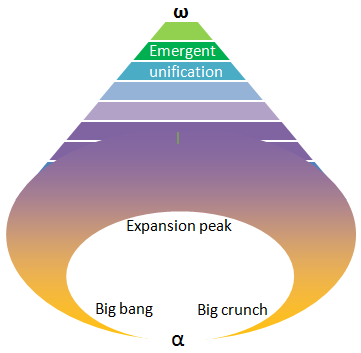
Once again i found that illustrating entropy merely as "disorder" is misleading and limited. A blank hard-drive has more thermodynamic order than the one containing Beethoven's symphonies. One shouldn't confuse the levels of the emergence pyramid. Biological or aesthetic order are far beyond thermodynamics. In that sense, the so-called Theory of Everything would be humbly relevant only to the bottom of the pyramid.
PPS: Vincent Mignerot summarizes (in French) ideas from François Roddier and Eric Chaisson, and pessimistically proposes that emergence is only a mean to creates structures able to destroy exergy even faster. Hmmm.. maybe yes. Then it's a race: I use you to grow up, you use me to blow up.
L'article a été mis sur Facebook ici.
Thursday, December 17 2015
By Matthieu on Thursday, December 17 2015, 05:55
What if our emotions had influence on water? This apparently obscure idea has been held by the controversial Japanese writer Masaru Emoto, who drew relationships between ice crystal shapes and emotions which were focused on water before freezing.
I've gained interest in this claim after the release of prof. Montagner's proof about the so-called "memory of water", which shows that water emits electro-magnetic (EM) waves based on the chemical it contained after high dilution, but water can also memorize EM waves emitted into it, and behave as if a new chemical substance is present. Since I believe our emotions primarily rely on brain and organs' neural activity, which in turn consists of electric signals that also generate small local EM waves, it leaves a tiny chance for both theories to rationally connect!
The experiment which i've done is another Do-It-Yourself test proposed by Emoto: influence the decay of rice by focusing emotions on it.
Here is my result after 112 days:
Maybe the religious tradition of blessing food before eating once simply used to be a rational sanitary measure!
I'm giving more information and pictures here below:
Monday, December 14 2015
By Matthieu on Monday, December 14 2015, 10:26 - Musique
Here is my latest creation, a music composed for the 24h-contest Noctaventure on the topic "Tempus fugit": time flies (when we're having fun). I classify it as an "etude" because of its construction constraint: a Re-Re clock pendulum ostinato, lasting throughout all the score.
The colours and melody evolve through various emotions, following the steps of human life: childhood, youth, then grief, panic on the face of death, confrontation against time, and finally the enlightenment of a teaching bringing peace.
The beautiful surprise and originality of this music is how an Indian melody naturally sprung out from the harmonic evolution, bringing a hypnotic climax to the topic: Krishna in his transcendent form as eternal Time-Spirit.
Here is the PDF music score.
Here is the mp3.
.png)
Friday, November 20 2015
By Matthieu on Friday, November 20 2015, 16:13 - Idées
The recent reading of the Wikipedia article on Jedi (the Star Wars frenzy can spark meaningful thoughts!) has lead me to realize how various fields of teaching and education can complement each others. Jedi are said to be "Polymaths", a word implying the mastery of many fields of knowledge, and at the Renaissance, mastery of arts as well. Since Jedi, like most Asian monastic traditions, blend rather physical training and wisdom, I came out with the following map of education:
The 4 fields of learning (Sport, Art, Science, Wisdom) are linked to 4 components of the person (Body, Heart, Mind, Soul), and nurture them with 4 types of food or accomplishment (health, beauty, science, peace).
Further, 4 types of historical teaching are proposed, giving emphasis on pairs of fields.
It is to be noted that back then, the definitions of the 4 fields were not as restrictive as shown here. For instance, Asian monks haven't excluded science but have been including part of it into their wisdoms.
Maybe an accomplished man has to explore and balance all these fields?
I've integrated this map into the broader cardinal cycle.
Friday, September 5 2014
By Matthieu on Friday, September 5 2014, 17:18 - Coups de coeur
En gribouillant avec ma nouvelle plume de calligraphie, une phrase m'est venue... "Tous les jours offrent leur lot de surprises et présents", avec l’idée de parler des petites perles quotidiennes, que l'on ne reconnait pas toujours, que l'on considère souvent comme dues, et que l'on ne pense que rarement à transmettre, tels les héritiers d'une grâce.

Saturday, July 21 2012
By Matthieu on Saturday, July 21 2012, 09:10
Here is a table which unifies in a original way scientific fields through one common phenomemnon: emergence. Each level emerges from the lower level and creates new entities, properties and behaviours.
I've discussed this in further details on this (French) forum: Article "émergence" sur l'atelier
| Objets | Interactions | Equations | Drivers | Speculative entities | |
| 5-Sociology | 2-Society, 1-Group | 2-Trade, war, 1-Language, help | Trade balance , migrations, debate | Ideals, aspirations | Spirit (of democracy, of competition, etc.) |
| 4-Psychology | 3-Thoughts, 2-Emotions, 1-Sensations, signal | Contradictions, associations, reflex | Choice | 3-Objective 2-Desire 1-Pleasure | 3-Consciousness, 1-Soul |
| 3-Biology | 2-Organs/ body, hormons, neurons, 1-Cell | Growth, vascularisation, metabolism | Regulations, osmotic balance | Nutrients | Life breath |
| 2-Chimistry | Molecule, Functional sites | Chemical reactions | Acido/ basic balance, oxydo/ reduction | Chemical potential | - |
| 1-Physics | 2-Fluids, 1-Particles, waves | 4 forces (electro-magnetic, weak, strong, gravity) | Mass energy charge conservation | Exergy | - |
Friday, February 13 2009
By Matthieu . on Friday, February 13 2009, 04:53 - Café du commerce
Sur la BBC, les passions se déchaînent dans le forum-sondage à propos de Darwin. Le modèle évolutionniste de Lamarck et Darwin me semble clairement confirmé. La plupart l'érigent en génie ultime... et font immédiatement le parallèle avec le créationnisme qu'ils enterrent avec les religions en bloc.
Dommage qu'on se construise encore des murailles, en forçant une opposition entre science et religion qui me semble inexistante. Il y a malheureusement de grandes communautés qui prennent les mythes au pied de la lettre et créent la contradiction avec la science. De la même façon que Zakir Naik glorifie le Coran sur ses détails scientifiques, d'autres taxent les religions de boniments.
Si l'on s'en tient au message entre les lignes de la Genèse, on peut faire cohabiter la création et l'évolution. L'idée centrale de ce passage me semble la notion de projet, d'intention divine quant à l'apparition de la vie et de l'homme. C'est à la fois métaphysique et crucial, indépendant de la science la plus sophistiquée. Je pense qu'on est pas là par hasard, apparus par un accident absurde.
Où mettre Dieu dans l'évolution ? Peut être a-t-il défini les règles du procédé en anticipant notre formation, ou bien peut être se cache-t-il dans l'aléatoire des mutations génétiques...
Je voudrais souligner une remarque que j'ai lue hier, disant que Darwin n'a de son vivant pas connu le modèle génétique. Ainsi, lorsqu'il parlait d'hérédité entre les générations, il englobait plus que des gènes, mais aussi la culture au sens large (comportement, langue, valeurs, etc.) L'hérédité de l'inné et de l'acquis. Cela permet d'élargir le champ d'application de sa mécanique.
Au final, on peut railler les créationistes-en-6-jours au vu des preuves tangibles qui s'accumulent, mais ce serait trop facile de rejeter toute la Bible sur le seul procès des marginaux.
Monday, January 19 2009
By Matthieu . on Monday, January 19 2009, 17:36 - Café du commerce
Ce conférencier populaire démontre à l'envie l'existence d'Allah par les prodiges scientifiques du Coran. Pourtant nombre d'arguments sont de sinistres mensonges. Quand finira-t-on de prendre les livres saints pour des traités de physique quantique ?
This lecturer often tells how to convert an imaginary atheist with cutting edge knowledge from Quran. I'm sorry to support that most of it doesn't hold historically... It of course doesn't prove anything against Allah, but one shouldn't take holy scriptures for scientific data.
Tuesday, December 16 2008
By Matthieu . on Tuesday, December 16 2008, 15:40 - Café du commerce
Résumé:
Cliquez pour la suite...
Tuesday, August 5 2008
By Matthieu . on Tuesday, August 5 2008, 09:18 - Voyages
Une affaire étonnante depuis quelques mois ici est que le premier ministre veut faire interdire aux non-musulmans d'utiliser le mot "Allah" ﷲ. L'électorat principalement malais ethnique, musulman de naissance, n'a pas l'air particulièrement choqué. Pour tourner l'affaire en dérision, l'hebdomadaire Herald a ironiser que le premier ministre Abdullah devrait donc être appelé Abdugod par les non-musulmans... ¬_¬'
La question est particulière, car en effet ce mot est parfois utilisé pour désigner Dieu chez les chrétiens d'ici. Bien que la plupart des communautés chrétiennes de KL soient en anglais, j'en ai déjà visité une spécialement pour malais en Bahasa Malaysia. J'avoue ne pas avoir compris grand chose, à part qu'ils disaient "Tuhan" et "Allah" pour Dieu, et aussi "Rasul" pour les apôtres, ce qui est également surprenant car ce terme arabe signifiant "messager" est un des noms dédiés à Mahomet psl.
L'argument le plus expéditif pour remballer cette curieuse idée est que, avant même que Mahomet psl soit né, le terme "Allah" était utilisé dans la culture arabe pré-islamique pour désigner une divinité parmi d'autres. D'autres part, le nom était aussi utilisé par les premiers chrétiens dans ces régions.
On pourrait donc répliquer: "vous voulez déposer un copyright sur "Allah", mais ce sont plutôt les chrétiens qui pourraient réclamer ce droit! !" (et toc)
Mon sentiment est que le gouvernement actuel, marqué par un nationalisme racial malais croissant, risquerait de briser un pont, une marque évidente et quotidienne que musulmans et chrétiens ont été beaucoup plus proches que l'histoire récente peut nous le faire croire.
Friday, July 4 2008
By Matthieu . on Friday, July 4 2008, 13:57 - Voyages
Plus encore que l'année dernière, on trouve à Kuala Lumpur des musulmans du moyens orient et du Golfe.
Parmi eux, deux grands groupes : d'un coté il y ceux comme les iranien(ne)s qui viennent respirer ici un peu de liberté, aux femmes peu ou pas voilées. De l'autre, on voit ces fameux musulmans arabes suivis de leur femme dont on ne devine que les yeux, entièrement couverte de noir, le suivant derrière à bonne distance.
En les voyant récemment il m'est venu une formule :
"Extrémisme exhibitionniste".
Car c'est bien le paradoxe, on veut cacher les charmes de sa femme par vertu, mais au final on s'affiche publiquement son attachement à une tendance de l'Islam, de façon provocatrice et ostentatoire.
Sunday, May 25 2008
By Matthieu . on Sunday, May 25 2008, 16:36 - Coups de coeur
Petite histoire naïve de celui qui va courir par une après-midi ensoleillée :
Sur le parcours habituel je réalise la quantité de détritus qui borde le chemin. En bonnes dispositions, tout juste dans l'euphorie d'un bon jogging qui démarre, et plutôt enclin à sauver le monde, je me dis : "Ok pour ramasser tous ces cartons et gobelets Mac Do, mais il me faut d'abord un bon sac plastique." Sur quoi Il me répond "Top la !". 100m plus loin, je fais un écart pour inspecter un sac, mais il est déchiré. "Ah non, il faudra faire mieux que ça." Plus loin, un autre sac dans les fourrés passe, mais j'ai la flemme de faire l'écart. 20m plus loin, un troisième se présente, et là je paie l'écart... et il est beau, propre, vide... "Ok, alors c'est parti !" Et me voilà lancé sur le parcours habituel qui prend un allure de Slalom pour attraper dans la course les divers machins. Moi qui croyais que ça m'empêcherai de courir tranquillement, ça rend en réalité l'exercice plus complet et fatiguant !
Sur le chemin du retour, sac moitié plein, je repasse dans la zone à haute pollution. Le sac se remplit vite, mais j'arrive au niveau du deuxième sac, celui que j'avais ignoré. Encore un beau, vide et net. Me voilà reparti ! Par contre, ce n'est pas parce que je fais mon numéro idéaliste-greenpeace que j'oublie le pragmatisme : pas de place pour tout, donc priorité aux gros trucs plastifiés. Malgré cela, les deux sacs sont vite pleins. Au bout d'un moment, je dis "Ok basta. Je veux un autre sac sinon j'arrête ce job en mousse !" Le sac ne vient pas, je trouve une poubelle et me débarrasse des deux ballots. Mais à peine 10m plus loin, la surprise ! Pour la première fois, je suis troublé dans mon enthousiasme naïf : un grand sac blanc, épais et tout neuf... la blague ? Rien de miraculeux ou de paranormal, juste un coup de pouce du hasard on dira... Alors le job se finit avec un gros sac de plus, et des passants qui m'auront regardé amusés ! Tant mieux si en plus j'ai pu surprendre, que ça fasse réfléchir et changer les comportements. Et on se sait jamais vraiment ce que causera ce genre de cercles vertueux que l'on lance...
Bref, ma morale à 4 sous :
> Il y a beaucoup à faire et on se sent insignifiant. Mais il faut bien commencer un jour.
> Chacun à le droit de réclamer un coup de pouce du hasard pour se lancer, et continuer. Mais prenez des engagements réalistes, et respectez-les quand le hasard remplit sa part du contrat.
> Enfin, restez pragmatiques sur les résultats, exigeants sur le degré d'inconfort que vous tolérerez, et surtout gardez l'espérance en ce hasard qui laisse rarement tomber les bonnes intentions.Engagement, fidélité, pragmatisme, et espérance !
- ceci était un communiqué de l'ADEME région Poitou-Charentes -
Friday, March 28 2008
By Matthieu . on Friday, March 28 2008, 12:10 - Café du commerce
C'est effrayant ce qu'on peut trouver près de chez soi...
Le député hollandais Geert Wilders a diffusé récemment ce court métrage sur LiveLeak.com.
Durant 15 minutes, il connecte les extraits les plus guerriers du Coran avec les discours d'extrémistes musulmans et enfin des photos d'attentats, sanglantes manifestations et exécutions, le tout sur fond de musique larmoyante signée Grieg. Par l'émotion plus que les arguments, il propose l'équation du triste amalgame :
Coran haineux => terrorisme islamiste => L'Islam est fondamentalement mauvaise et doit être combattue, tout comme le nazisme en son temps.
Après les caricatures Suédoises de Mahomet, le film de Theo Van Gogh et son assassinat, les voix sont plus fortes de jamais pour défendre la liberté d'expression.
Expression, oui, mais de quoi ?
Il est pourtant interdit de publier des diffamations et des incitations haineuses. Le sujet est suffisamment sensible pour mériter la prudence.
Dénoncer un problème et ouvrir le débat dessus, oui, c'est vraiment ce dont on a besoin.
Mais publier des dessins, films, ou autres œuvres à teneur artistique ou émotionnelle me semble être aussi imprudent que maladroit.
Car enfin que cherche-t-on ?
A provoquer sous prétexte de vouloir ouvrir un débat ? Il y a des façon bien plus efficaces de s'y prendre, car la colère et le sentiment d'être insulté ne sont évidemment pas propices au dialogue et au débat.
A protester contre les interdits de l'Islam et les narguer en leur montrant qu'ici on peut encore faire ce qu'on veut ? Encore de la provocation qui ne fera certainement pas avancer le problème, au contraire...
Donc à propos de cette chère liberté d'expression, oui, on à le droit de débattre de tout. Non, on ne doit pas inciter à l'amalgame ou à la haine.
Et pour ce qui est d'éviter de choquer ou provoquer nos interlocuteurs, ce n'est pas un luxe: c'est dans l'intérêt de tous. Comment espérer inviter au dialogue des musulmans en dessinant leur prophète, visage découvert, au milieu d'animaux honnis, avec une bombe sur la tête ? On a pas besoin de ça.
Une phrase comme : "L'extrémisme islamiste est une bombe à retardement" aurait très bien fait l'affaire pour transmettre l'idée en évitant l'ambiguïté et la provocation.